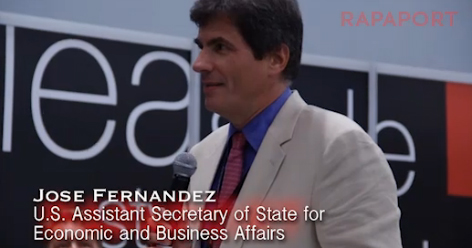|
|
Industry Thought Leaders Discuss Ethics and the Diamond Pipeline
Aug 7, 2013 8:36 AM
By Rapaport News
|
|
|
RAPAPORT...
The importance of encouraging diamond source responsibility and the best ways to inspire ethical behavior in the jewelry industry was debated at "Living Up To Diamonds," a discussion panel hosted by the Jewelers of America (JA) at the JA New York summer show on July 29. The U.S. Assistant Secretary for Economic and Business Affairs, Jose W. Fernandez, started the session by pointing out that the industry stood at a crossroads. "They are in the position where they will either have a tainted brand or they will have an industry that will continue to grow… continue to bring people out of poverty," he said.
Fernandez, the top U.S. official overseeing government policy related to the Kimberley Process Certification Scheme (KPCS), spoke about the positive effects of the program -- in 10 years traded conflict diamonds went from 15 percent of the total to 1 percent. However, he pointed out, the current system does not address situations such as working conditions, child labor, human rights, environmental practices and other problems so an expanded definition of what a conflict diamond is should be discussed to insure that diamonds are responsibly sourced in all instances. "Consumers want insurances that the gems that they wear - the diamond ring that a groom slips on his bride's finger on their wedding day has not been produced by a system that caused people to die or to suffer," he said. he said.
He encouraged the industry to become involved in demanding ethical conditions, offering that "diamonds are important to many economies, including ours and what this means is that diplomacy and development cannot, in fact, work in isolation from the private sector." Fernandez noted that 40 percent of the world's jewelry was purchased in the U.S. and because of that "U.S. companies can be the leader and driver of change." He also mentioned that responsible sourcing was a market opportunity and that despite the Kimberley Process' good work, more needed to be done. "Don't wait for the Kimberly Process to catch up to industry," he emphasized. "Industry, in fact, has to lead the way on responsible sourcing."
After Fernandez's comments, the panelists echoed many of the assistant secretary's sentiments. Moderated by Whitney Sielaff, the publisher and editorial director of ''National Jeweler,'' speakers included: Ngomesia Mayer-Kechom, the manager for international programs at the Diamond Development Initiative International (DDI); Dr. Benjamin Chavis, the senior strategic advisor for the Diamond Empowerment Fund (DEF); Cecilia Gardner, the president, CEO and general counsel of the Jewelers Vigilance Committee; David J. Bonaparte, the president and CEO of JA and Martin Rapaport, the chairman of the Rapaport Group.
Mayer-Kechom focused mostly on the artisanal mining sector, mentioning that the group faced distinct challenges since it was "vastly informal" and "one of the most vulnerable sectors in terms of social and environmental issues" and to implement additional standards those factors needed consideration.
Chavis spoke about the importance of transforming lives in diamond-producing countries, and how through support of the industry the DEF awarded more than 2,000 education scholarships and opportunities to African students since 2007. "The whole issue of responsible sourcing is sometimes focused on the jewel, the gem, the diamond, the mineral - whether or not these diamonds or these minerals are in conflict - but for the DEF perspective, we see responsibility sourcing also including people," he said. "How people are resourced. What is the responsibility of the industry in these communities."
The positive effects of the KPCS was emphasized by Gardner, who credited the process as "the fundamental source of so much of the discussion we've been having over the years about responsible sourcing." Both she and Bonaparte acknowledged gaps that need to be addressed in the KPCS.
Rapaport offered that companies needed to be responsible for their supply chains. "I believe that the No. 1 issue here is the ethical and moral responsibility we have as humans not to make money off of someone else's misery."
Written by Sandra Mardenfeld
|
|
|
|
|
|
|
|
|
|
Tags:
conflict, diamond development initiative, Diamond Empowerment Fund, diamonds, ethical, Jewelers of America, Panel Discussion, Rapaport, Rapaport News, responsible, sourcing
|
|
|
|
|
|
|
|
|
|
|

|
|